Oh, the joy of discussing the dreaded down payment! There are many, many options for securing and putting forth a down payment for your home purchase. With the ever-changing lending options available, there are certain programs out there that require as little as a 3% down payment. 20% is still the gold standard, but you do have options!

Even if you are eligible for a ‘first-time’ home buyers discounted down payment, you should consider the pros and cons carefully. The cons for this are several but primarily revolve around the need for private mortgage insurance (aka PMI), as well as a higher overall monthly cost due to higher fees and potentially a higher interest rate. The pro for this is quite obvious-you can get out of the high rental market sooner and start saving for the future.
The major secret to managing a down payment is to plan for it. It is easy to get an idea of how much you will need to save by looking at the average home prices in your area. A 5% down payment on a $200,000 home will run you $10,000, which can seem like a big chunk of change to anyone.
Why a larger down payment?
Many people are being advised to take advantage of the low down payment options that are currently trending. What you must realize is that this carries a certain amount of risk. A larger down payment gives you equity in a home, while a small down payment could leave you upside down on a mortgage when the market cycles downward (which happens!)
Low down payments will typically carry a higher risk on the overall evaluation of the mortgage. For this reason, the mortgage lender will require private mortgage insurance in most cases. This is a non-deductible expense that increases your monthly payment because of the increased risk to the mortgage holder.
Why a smaller down payment?
While the risk is a bit higher, there are certain advantages to using a low down payment program. The obvious one is that it keeps more money in your pocket for repairs and upgrades, which can quickly add value to your home.
While your payment will be higher each month, you are able to keep a higher balance in your savings and/or checking account initially, which will lend itself useful in home ownership (everyone needs an emergency fund!). For the average adult, a smaller down payment for the services with making it with its much more feasible than a 20% or even 10% down payment. With the cost of rent surpassing what a mortgage payment would be in this low-interest rate environment, it is well advised to ask the questions and check the numbers.

Ways to save
If you need to save aggressively to achieve a high down payment amount in a short period of time, you need to alter your spending habits and put every extra penny in a secured savings account. A great way to consistently add to a savings account is to send a portion of your check to the account on your automatic deposit. This can build your savings on a predictable and consistent basis.
A common theme for saving substantial funds each month is to take any additional money from bill savings and put it towards your down payment fund. Paying off a car, additional savings on insurance, or even a cheaper than average utility bill can offer opportunities to push money into your savings. This philosophy is effective on any budget.
When looking to purchase a home, there are literally hundreds of things that can help the overall process. Stress throughout the process is almost unavoidable but can be helped by having an awesome Realtor team. [Watch this video: How to Choose a Realtor] Building an understanding of how a down payment affects your overall expected monthly payment, as well as the loan to value on your mortgage, is paramount to making a good business decision. Once you have an idea of the amount of money that you will need to achieve your down payment, useful saving strategies will allow you to plan and budget accordingly. This is one of many tips for prospective homebuyers that can be the difference between a major headache and a home run!
Want to know exactly what to ask a prospective mortgage lender? Call, text or email anytime. We’re delighted to help property buyers in all price ranges, in all areas of the Charlotte region (and if you are elsewhere, we have great contacts for you!).
